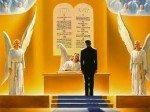The famous Bible (Matthew) verse: “Judge not that ye be not judged” has two (2) meanings, I think.
The obvious, mundane meaning is that the law of karma (the law of cause and effect) will operate and we will be judged by others if we first judge them.
The second, deeper meaning is that the very act of judging creates an apparent independent self. We must be separate, divided from that which we are judging. Judge not, so that an independent self is not formed by the act of judging. All judgmental thoughts come from sakkaya ditthi, the wrong view of self. As Ajahn Sumedho says, Don’t Take Your Life Personally.
An old Buddhist story tells of a famous saint who was invisible to demons because his thoughts were pure and nonjudgmental. One day a demon had a brilliant idea. Knowing that the monastery where the saint lived had a requirement that not a single grain of rice was to be wasted, the demon spilled a bowl of rice on a path where the saint walked daily. Sure enough, the saint saw the spilled rice and thought: “This is terrible; someone has acted foolishly. Seeing so much wasted rice really makes me angry.” At that moment, the demon finally got to see the saint.
Our practice should include daily or at least weekly recitation of Affirming Faith In Mind (introduced in the chanting section of Advanced Zen). Repeated recitation of that great work of art will gradually wear down the habit of judging, the habit that creates belief in an independent self standing apart from, and in judgment on, everything else.
It is the act of making distinctions, judgments, that divides reality into pieces, that creates the dual world of inside and outside, self and other, thereby creating the idea that the earth and the Garden of Eden are two different places, that life and death are two different states, that ourselves and the Buddha are two different beings.
Such thoughts are mortal thoughts. That’s why the innermost selves of Adam and Eve told them not to enter into the knowledge of good and evil. When reality is cut in two, self and other appear, good and evil (wisdom and ignorance) appear, life and death appear.
We don’t have to click our heels three times to go home. All we have to do is to drop the wrong view of a self sitting in judgment, a self observing an external world. The Garden of Eden is here and now and no one can drive us from it except our own delusions.
We divide time into seconds, minutes, years and so on but time remains undivided; we only divide ourselves. We can divide reality as much as we want, but it is us that that gets divided, not reality. So we sit in Zen without judgment, and we let reality be whatever it is.

